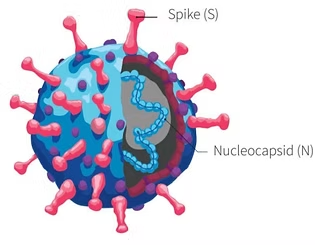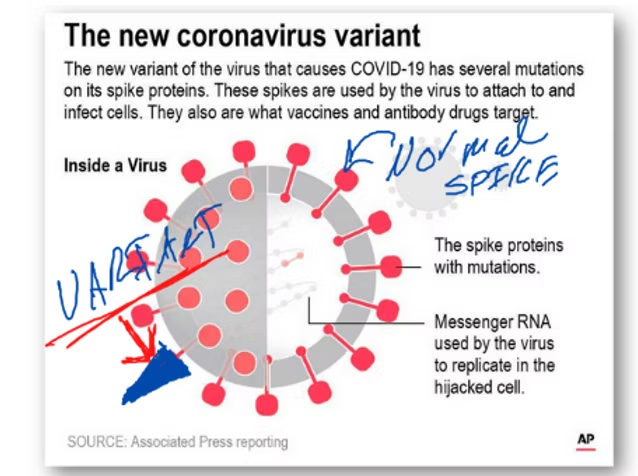How Spike Proteins and Antibodies Work in Immunity
Spike protein s are a virus’s tool to attach itself to your cells and begin attacking. These proteins take a specific shape, which your body uses to create antibodies against the virus. The antibodies are shaped specifically to attach to the spike proteins, much like a lock and key. The antibodies then act as a barrier between your cells and the virus, preventing the virus from attaching. They also act as a flag for your immune system, signaling it to attack the virus.
However, viruses replicate quickly, allowing them to mutate and change structure frequently. This restructuring changes the shape of the spike protein, rendering the original antibodies less effective against the virus. Since the key no longer fits the lock, your body must create a new antibody to protect you against the new strain of the virus.
How Vaccines Work
In a typical vaccine, such as for chickenpox, scientists take the virus and blend it, delivering patients a small sample of the virus through a shot. When you get a chickenpox vaccination, you’re getting a multitude of different particles of that virus. The critical part is that for a strong immune system, you need the whole global picture of that virus in the vaccination, so you have a better immune system.
Unlike a typical vaccine, the COVID-19 vaccine delivers only a piece of the spike protein to your body. If the entirety of the COVID-19 virus represents a webpage, the highlighted section is the only piece being delivered through the COVID-19 vaccine. This is problematic because your body can only create an antibody for that specific part of the virus, but it has no information about the entire makeup of the virus. If the virus mutates, your body has no idea how to deal with the new variant.
The COVID-19 vaccine uses mRNA gene therapy to teach your immune system to create a response to the virus by building a piece of the COVID-19 spike protein. A true vaccine delivers a sample of the virus to your body so that your natural immune system can create antibodies to fight off that virus.
After your body creates a piece of the spike protein, it presents that version of the spike protein on the surface of your cell. Your immune system detects the spike that doesn’t belong on the surface of your cell and makes antibodies against it. If you contract the virus, the antibodies will recognize that spike protein and attach, allowing your immune system to kill it.
However, if the spike protein looks like a heart cell, your antibodies may start attaching to it, and your immune system may start attacking your heart, leading to autoimmune diseases.
Moreover, if the virus mutates after you’ve received the vaccine, your body won’t have the tools to attack the new strain because you’ve only been given a small portion of the virus, not the entire thing. A true vaccine creates antibodies against a whole tissue, allowing your body to create a response to any variant you may come into contact with. However, with only a fraction of the information from mRNA vaccines, your body is not equipped to handle any mutations in the spike protein.
Your God-Given Immune System
People who have passed from COVID-19 have an average of 2.6 comorbidities, which could mean they are obese, have high blood pressure, high cholesterol, etc. This means their bodies are already weak.
Conclusion
In conclusion, relying solely on vaccination may not be the best solution to fight off COVID-19. God-given immunity can be a stronger defense mechanism against the virus, equipping the body to fight off new variants. The COVID-19 vaccine may help the body create antibodies, but it only delivers a small piece of the virus, making it less effective against mutations. People should explore both options and weigh their risks and benefits before making an informed decision.
Frequently Asked Questions (FAQ)
According to the blog, a traditional vaccine (like for chickenpox) delivers a "multitude of different particles" or a "whole global picture" of the inactivated virus. In contrast, the COVID-19 mRNA vaccine is described as delivering only a single piece—the spike protein—rather than the entire virus, which the author argues provides the immune system with incomplete information.
The blog posits that natural infection exposes the immune system to the entire virus, allowing it to create a broad defense against various parts of it. This "God-given" immune system is argued to be better equipped to recognize and respond to mutated variants because it has the "whole global picture," unlike the vaccine which only presents a single piece.
The blog suggests two main risks. First, it claims that if the vaccine-induced spike protein resembles human tissue (e.g., a heart cell), it could trigger an autoimmune response where the body attacks its own organs. Second, it states that the vaccine is "less effective against mutations" because it only targets one part of the virus that can change.
The blog describes the COVID-19 vaccine as using "mRNA gene therapy" to teach the body's cells to create a piece of the spike protein. The immune system then detects this protein on the cell's surface, makes antibodies against it, and learns to attack the real virus if encountered later.
The blog states that people who have passed away from COVID-19 had an average of 2.6 comorbidities (pre-existing conditions like obesity, high blood pressure, etc.), implying that their "bodies are already weak" and that this is a significant factor in disease severity.










